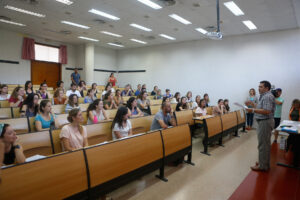Finding jobs in Madrid has been harder since Spain was greatly affected by the economic crisis. Yet, the city of Madrid is still recognized as the major business center of the country and, in some industries, where more jobs are available. The northern part of Madrid’s center is where business activity is mainly situated, and the major trade fairs are held in the eastern part of Madrid.
After Catalonia (the region where Barcelona is located), Madrid is the autonomous community with the biggest foreign population, accounting for almost 15%. However, Madrid’s foreign population has declined (around 8%) as foreigners move back home, claim Spanish citizenship or find better job opportunities abroad. However, this doesn’t mean finding a job in Madrid is impossible.
This guide provides everything you need to work in Madrid, including where to find jobs in Madrid for English speakers and foreigners, in addition to the overview information and job websites provided in our guide to finding jobs in Spain.
Resume.io
Trying to land the job that will take you on your next big adventure? Make sure your application is top of the pile with Resume.io’s online resume builder. They provide resume templates, cover letter help, and more, making job applications effortless. Make it to the next round with Resume.io.
The job market in Madrid
With the unemployment rate in Spain hovering around 19% in 2017, finding a job in Madrid can be harder than in other European cities. However, Spain is known for its ability to attract business and today is one of the EU’s fastest-growing economies.
Despite a severe financial crisis, Madrid is showing signs of recovery. In some industries, there have been more available jobs in Madrid following the crisis, but this is not the norm. Proportionally, unemployment is not as stark in Madrid (16%), falling almost 10% in 2015. Around 16% of unemployed workers in Madrid are foreign.
Madrid’s job market, however, has a higher unemployment rate among younger people, particularly university graduates. Youth unemployment in Spain in the first quarter of 2017 sat around 42%. Another issue is that jobs in Madrid for university graduates tend to be neither well-paying nor stable; they’re closer to the Spanish minimum wage.
Thanks to the labor laws in Spain, many companies are hesitant to hire someone new on a permanent basis because of how costly it can be. As a result, most contracts are temporary, reducing job security even when looking for part-time jobs in Madrid. In 2016, more than 90% of all contracts were temporary, with one in four being for less than seven days. Tourism and construction, in particular, rely on temporary contracts. You can follow local job market updates via Madrid’s online newspaper, the ABC, as well as find jobs in the classified sections of El Mundo and El Pais.
Madrid represents one of the biggest economies in Spain. The GDP per capita (around €31,000) is more than 35% higher than the rest of the country. This is largely due to the services sector – 80% of Madrid’s GDP – with trade, public administration, ancillary services, and professional activities pulling their weight.
Requirements to work in Madrid
As in other EU and EEA (European Economic Area) countries and Switzerland, citizens of member states do not need a Spanish work permit to be hired legally in Madrid. However, you must register with the tax office, called the Agencia Tributaria, and get an NIE number (foreigner’s identity number). Non-EU citizens must obtain a Spanish work visa before they can work in Madrid.
Getting a work visa means you have to first be accepted for a job. Your employer then arranges a work permit on your behalf. Once you have been granted work authorization through the Dirección Provincial de Trabajo, Seguridad Social y Asuntos Sociales, you can then apply for a permit that allows you to live and work in Madrid for 12 months. You have to apply for a new visa every 12 months. Read more on how to get a work visa in Spain.
Upon arriving in Madrid, all residents have to get an NIE number (Número de Identidad Extranjero, or foreigner ID number), which you typically get from your local police station. You will also need to register at Spanish tax office, although your employer may arrange this for you. Read more in our guides to taxes in Spain and getting an NIE number.
The process for people who want to be self-employed in Spain is a bit different, as they have to apply for a work permit themselves at the Spanish consulate or embassy in their country, and then apply for a visa. They will still need an NIE number and to register with the tax office. Read more about starting a business in Spain and taxes for self-employment in Spain.
Read more on the general requirements for getting a visa or permit in Spain.
Expat jobs in Madrid
To work in Madrid, foreigners with some Spanish language skills have an advantage in the hiring process. The selection of jobs in Madrid is significantly smaller if you don’t speak the language. There are English-speaking jobs in Madrid; however, you may still need basic Spanish to communicate with coworkers or clients. Around 17% of new contracts signed in Spain are by foreign nationals.
Madrid also accounts for around 16% of all companies located in Spain. This makes it the second city with the highest number of companies, after Barcelona. Some international and multinational companies in Madrid include Accenture, Aegon, Indra, BBVA, PwC, IBM, Amadeus, Deloitte, Everis, Endesa, Mercedes Benz, Havas Media, Movistar, SinDelantal, KPMG, EY, Hewlett-Packard, Ericsson, and Vodafone. Banks are also big in Madrid, with three large multinationals – Telefónica, Repsol-YPF, and Banco Santander – having their headquarters in Madrid.
The majority of jobs are in the services sector. This sector accounts for around 85% of total employment. The main representative activities in Madrid include logistics, wholesale and retail, food and beverages, finance, healthcare, marketing, accounting, legal services, IT, administration support, and technical architectural services.
Many jobs in Madrid are aimed at native English speakers, although in lower supply. Some areas also experience shortages making it easier and quicker for companies to get work permits for foreigners (for example, IT).
If you prefer to work from home, freelance writing, editing, and translating can be a good option for foreigners to find work, even before they arrive. However, you must apply to be autónomo and get a Spanish self-employment visa. There’s also a monthly social security fee regardless of your earnings; read more about taxes and social security for freelancers in Spain. An advantage of working with clients in Europe, however, is that some freelancers can claim VAT-free services between member countries.
Jobs in Madrid for English speakers
If you don’t speak Spanish, you can still find a good number of English-speaking jobs in Madrid to earn a basic income.
A common path is teaching English in Spain. English-language teachers are well sought after in Madrid, and language academies tend to hire native English speakers over even highly-qualified native Spanish teachers. Your best bet is to get private students alongside any work you might find at a language school. Private language schools also favor hiring native speakers. Working in the public school system as an expat is not impossible, but you need a teaching degree or TEFL certificate.
Another common English-speaking job in Madrid, especially for those with limited Spanish skills, is working as an au pair, nanny, or canguro (literally ‘kangaroo’), which is essentially a nanny. This is ideal for those looking for a place to live, some expendable income, and people to practice Spanish with. There are many parents in Madrid looking for native English-speaking canguros, to pick their kids up from school while they’re still at work, prepare dinner, and do household chores.
English-speaking customer service representatives are also in demand. This usually means working at a call center. If you work part-time, you can attend Spanish classes to improve your skills for your next job in Madrid.
As the capital of Spain, Madrid is also a popular tourist destination. That means there are hotels, bars, pubs, and restaurants in tourist areas that hire English speakers. Many hotel jobs in Madrid are in front desk services; you may also need some Spanish skills. Hostels are great to look for work as well, as sometimes you can find accommodation included. Such jobs may not offer the highest salaries, but it can be sufficient to cover rent.
Teach English in Madrid
If you are looking for work as an English teacher in Spain, Madrid is a very promising location for finding a job. Native English speakers are in-demand at Spanish language schools. However, Spain is one of the few EU countries that doesn’t report shortages for qualified teachers.
As such, you will have a better chance at landing a job if you have:
- at least a bachelor’s degree
- some knowledge of Spanish
- credentials for teaching English, such as TEFL or CELTA, or some other teaching degree.
There are two main ways of teaching English in Madrid. One is to work privately and the second is to work at a language school. More information about job opportunities in the teaching sphere can sometimes be found in the English newspaper In Madrid (www.in-madrid.com). You can also e-mail your CV or contact language schools in Madrid directly. See our guide to language schools in Madrid or click here for listings of Madrid-based language schools. Doing an internet search will also reveal numerous organizations that advertise online teaching jobs in Spain, and some also help with the moving process, such as British Council, Go Overseas, CIEE, and Spainwise to name but a few.
Qualified teachers can also consider working at Spanish primary schools or Spanish universities. English teachers will typically have a better chance of finding a job in Madrid at private schools in Spain. Find a list of international schools or read more about the Spanish education system.
Where to find jobs in Madrid
If you are looking for a job in the Spanish capital, one of the best ways is to visit the popular Spanish job engines, such as infojobs.net and infoempleo.com. Both websites offer different listings and ways to narrow down your job search. Although most of the listings are in Spanish, listings in English can also be found. Registration on the website is only necessary if you apply for a position. You can also find jobs through community employment offices in Madrid (find your closest office on the Comunidad de Madrid website).
There is, however, no shortage of job websites in Madrid, including some of which are focused on listing jobs for foreigners and English speakers. Below are some of the main sites where you can find jobs in Madrid online (including Spanish and English-language sites):
Job agencies in Madrid
If you have relevant qualifications and experience, hit the recruitment agencies to find work in Madrid. Most recruitment agencies in Madrid post jobs across multiple industries, but there are also agencies that headhunt prospective employees with specialist skills. The government offers a list of Spanish job agencies by region.
Recruitment agencies in Madrid typically invite you to their offices for a brief interview and an aptitude test. The interviews will usually be in Spanish, so if your language skills are not up to scratch enquire whether this will adversely affect your chances before wasting your time going through the registration process. Most recruitment agencies in Spain have online registration.
Below are some recruitment agencies offering jobs in Madrid:
Networking in Madrid
Another good option for finding the work in Madrid is to join professional associations and attend networking events. Many jobs are filled by word-of-mouth or through personal contacts, so networking is key to finding better jobs in Madrid.
Here are some of the most active organizations and groups that hold regular events and meetings in Madrid.
Starting a business in Madrid
If you are eager to start your own business in Madrid or develop your existing business further, Cámara Madrid is the local chamber of commerce, which provides useful information and advisory business services.
Preparing a Spanish CV and interview tips
When preparing a Spanish-style CV, you should apply for a job in the language in which it is advertised. Both your CV and cover letter should be in the same language. Read more on how to prepare a Spanish CV. You might also find it useful to build a CV online using a resume builder such as Resume.io.
If you are invited to an interview, there are a few things to keep in mind: Dress smartly, especially for a corporate job, and arrive 5–10 minutes early, regardless of what you might have heard about Spaniards and tardiness. Wait for the interviewer to shake your hand and invite you to sit down.
Even if the interviewer speaks English, it will work in your favor if you speak in Spanish to show your level. You can always ask which language the interviewer prefers first. Use the formal ‘usted‘ rather than the informal ‘tú‘, unless told otherwise. Be friendly and show your personality, but speak formally and try to avoid slang or other informal language. It is also considered impolite to ask about salary in an interview setting. It is useful to learn some aspects of Spanish business culture to avoid awkward cultural situations.







